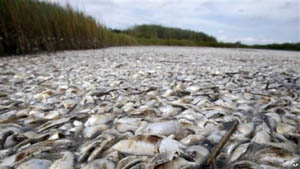VOA慢速英语:墨西哥湾的“死亡区域”
From VOA Learning English this is As It Is!
I’m Anna Matteo in Washington.
Coming up we hear about a dead zone in waters near the United States. Thisdead zone has nothing to do with burial places, zombies or monsters or that 1983 movie called “The Dead Zone.”
Christopher Cruise tells us what a dead zone is and how some scientists aretrying to bring it back to life.
The area known as a dead zone develops every springin the Gulf of Mexico near the mouth of the MississippiRiver. It can be as large as 13,600 square kilometers,extending all the way to the eastern Texas shoreline.
Scientists know what causes this dead zone, and anew study suggests an answer. But the solution mightbe hard to accept for those who live far away from thecoastline.
Bayani Cardenas is a professor of water studies at the University of Texas atAustin.
He wondered why natural cleaning, or filtration, does not remove nitrates from the Mississippi River that create the dead zone in the Gulf of Mexico. He saysrivers generally filter out materials like nitrates.
 |
|
The "Dead Zone" kills thousands of fish every spring in the Gulf of Mexico. Dead pogies litter the Louisiana coast in the southern U.S. |
"You can think of it as a spiraling flow back around the bank of the river, wherea water molecule goes into the bank, comes back out into the river at somedownstream point, and it does that repeatedly as it travels downstream."
Professor Cardenas says his recent study shows that more than 99 percentof the river’s water does pass through the river bank material, or sediments, on its way south. But he adds that the river system is simply overwhelmed by the amount of nitrogen it carries.
This nitrogen-rich water supports the growth of algae. As the algae dies, itsinks to the bottom where it breaks down, or decomposes, taking oxygen from the water. This condition is called hypoxia and is deadly to fish and shrimp.
The Mississippi river system carries water to the gulffrom 33 states and two Canadian provinces. Along theway, chemicals like nitrogen that are used in farmingenter the river system. Farmers say the chemicals arenecessary. But Mr. Cardenas thinks that the only way tofix the dead zone problem is for farmers to use lessnitrates.
Aaron Packman is a civil and environmentalengineering professor at Northwestern University. Hesays farmers may be able to better control the amount of nitrate fertilizer theyput on fields.
“How much fertilizer do you need to give you good yields and then how muchis maybe a marginal gain from adding lots more fertilizer? So there is really aquestion here: can you maybe back that off (reduce the amount) and maybeget close to the same level of yield without having such a negative impact.”
Aaron Packman explains how large the Mississippi river system is. He alsodescribes how farming practices upstream affect the areas downstream.
“The Mississippi river system is 40 percent of the surface area of thecontinental United States. I think it takes some further work in the distributiveareas upstream that are the source of a lot of the nutrient.”
The water in the Mississippi river system should be able to clean, or filter,itself naturally as it flows downstream. But human-made structures used toimprove travel on the river and to control floods have hurt this natural cleaningprocess. Bayani Cardenas says filtration works better when theriver water travels through twists and turns. Thesetwists and turns force the water to spend more time in the natural materials that clean it.
“A straight channel won’t offer this buffering. A verysinuous channel provides a lot of the contact of the riverwater with the sediment.”
In the coming months, storms will mix the gulf waterand the dead zone will disappear. But it will return next year. And scientistssay it will grow larger in years to come if something is not done to reduce theamount of nitrogen in the Mississippi River.
I'm Christopher Cruise.
Thanks, Christopher.
And I’m Anna Matteo in Washington.
Too much nitrogen leads to too much algae which leads to dead fish --proving that too much of a good thing is sometimes not good.
When have you had too much of a good thing? Tell us in our commentssection! It's a great place to practice your written English.
- 频道推荐
- |
- 全站推荐
- 推荐下载
- 网站推荐




















